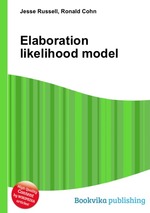Elaboration likelihood model
Jesse Russell Ronald Cohn
бумажная книга
High Quality Content by WIKIPEDIA articles! The elaboration likelihood model (ELM) of persuasion is a dual process theory of how attitudes are formed and changed that was developed by Richard E. Petty and John Cacioppo in the early 1980s (see also attitude change). The model proposes an "elaboration continuum," which determines the extent to which arguments are processed and evaluated (high elaboration) versus peripheral cues such as source expertise or attractiveness (low elaboration) shape persuasion. The model is similar to the Heuristic-systematic model of information processing developed around the same time by Shelly Chaiken.


